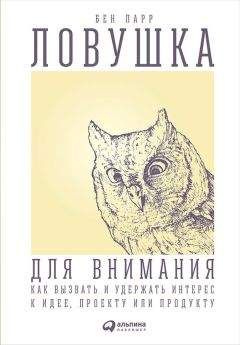Бен Парр - Ловушка для внимания: Как вызвать и удержать интерес к идее, проекту или продукту
media-business-advertising-guy-s-guy-tired-plain-old-soap-old-spice-counting-it.html.
Марк Фицлофф, интервью с автором по телефону, 13 июля 2013 г.; Brenna Ehrlich, “The Old Spice Social Media Campaign by the Numbers,” Mashable, July 15, 2010, http://mashable.com/2010/07/15/old-spice-stats/; David Griner, “Hey Old Spice Haters, Sales Are Up 107%,” AdWeek, July 27, 2010, http://www.adweek.com/adfreak/hey-old-spice-haters-sales-are-107–12422.
Rick Kissell, “It’s Official: ‘Game of Thrones’ Is HBO’s Most Popular Series Ever,” Variety, June 5, 2014, http://variety.com/2014/tv/ratings/its-official-game-of-thrones-is-hbos-most-popular-series-ever-1201214357/.
Ken Tucker, “Why Is Game of Thrones So Popular?” BBC, April 7, 2014, http://www.bbc.com/culture/story/20140407-why-people-love-game-of-thrones.
Глава 5. Вознаграждение
Leslie A. Perlow, Sleeping with Your Smartphone: How to Break the 24/7 Habit and Change the Way You Work (Boston: Harvard Business, 2012).
Doug Aamoth, “Study Says We Unlock Our Phones a LOT Each Day,” Time, October 8, 2013, http://techland.time.com/2013/10/08/study-says-we-unlock-our-phones-a-lot-each-day/.
Кент Берридж, интервью с автором по телефону, 16 апреля 2014 г.
Cash, Hilarie, Cosette D. Rae, Ann H. Steel, and Alexander Winkler, “Internet Addiction: A Brief Summary of Research and Practice,” Current Psychiatry Reviews 8, no. 4 (2012): 292.
Brian A. Anderson, Patryk A. Laurent, and Steven Yantis, “Value-Driven Attentional Capture,” Proceedings of the National Academy of Sciences 108, no. 25 (2011): 10367–71.
Richard M. Ryan and Edward L. Deci, “Intrinsic and Extrinsic Motivations: Classic Definitions and New Directions,” Contemporary Educational Psychology 25, no. 1 (2000): 54–67.
Jessica Guynn, “L.A. Startup Looks for the Most Interesting Engineers in the World,” Los Angeles Times, December 1, 2011, http://latimesblogs.latimes.com/technology/
2011/12/la-startup-is-looking-for-the-most-interesting-engineers-in-the-world.html.
Дэниел Пинк, интервью с автором по телефону, 16 июня 2014 г.
Timothy A. Judge et al., “The Relationship Between Pay and Job Satisfaction: A Meta-Analysis of the Literature,” Journal of Vocational Behavior 77, no. 2 (2010): 157–67.
Gregory S. Berns et al., “Predictability Modulates Human Brain Response to Reward,” Journal of Neuroscience 21, no. 8 (2001): 2793–98.
Брайан Вонг, интервью с автором по телефону, 17 апреля 2014 г.
Chou, Yu-kai, “The Six Different Contextual Types of Rewards in Gamification,” Yu-kai Chou Gamification. November 11, 2013. http://www.yukaichou.com/marketing-gamification/six-context-types-rewards-gamification.
Leslie Scrivener, “Terry’s Running for the Cancer Society,” Montreal Gazette, April 28, 1980; Leslie Scrivener, Terry Fox: His Story, rev. ed. (New York: McClelland & Stewart, 2010).
Пинк, интервью с автором.
James K. Harter et al., “Causal Impact of Employee Work Perceptions on the Bottom Line of Organizations,” Perspectives on Psychological Science 5, no. 4 (2010): 378–89.
Шерил Сэндберг, интервью с автором по телефону, 13 мая 2013 г.
Steven Reiss, Who Am I?: 16 Basic Desires that Motivate Our Actions and Define Our Personalities (New York: Penguin, 2002).
Пинк, интервью с автором.
Robert Weisman, “An Iconoclast’s Ideas for Redefining Management,” Boston.com, May 9, 2004, http://www.boston.com/business/articles/
2004/05/09/an_iconoclasts_ideas_
for_redefining_management/.
Amy Sawitta Lefevre, “Bangkok ‘Smoking Kid’ Lights Up Internet with Quit Message,” Reuters, June 22, 2012, http://www.reuters.com/article/2012/06/22/
net-us-thailand-smoking-idUSBRE85L0E420120622; Ogilvy & Mather Bangkok, “Smoking Kid — Best of #OgilvyCannes 2012 / #CannesLions,” YouTube video, June 6, 2013, https://www.youtube.com/watch?v=g_YZ_PtMkw0.
Берридж, интервью с автором.
Maryellen Hamilton and Suparna Rajaram, “The Concreteness Effect in Implicit and Explicit Memory Tests,” Journal of Memory and Language 44, no. 1 (2001): 96–117.
Dan Ariely, Emir Kamenica, and Dražen Prelec, “Man’s Search for Meaning: The Case of Legos,” Journal of Economic Behavior & Organization 67, no. 3 (2008): 671–77.
Тарик Шокат, интервью с автором по телефону, 25 июня 2013 г.
Julie Jargon, “At McDonald’s, Salads Just Don’t Sell,” The Wall Street Journal, October 18, 2013, http://online.wsj.com/news/articles/
SB10001424052702304384104579139871559464960.
Keith Wilcox et al., “Vicarious Goal Fulfillment: When the Mere Presence of a Healthy Option Leads to an Ironically Indulgent Decision,” Journal of Consumer Research 36, no. 3 (2009): 380–93.
Ayelet Fishbach and Kristian Ove R. Myrseth, “The Dieter’s Dilemma: Identifying When and How to Control Consumption,” in Obesity Prevention: The Role of Brain and Society on Individual Behavior, ed. Laurette Dube et al. (London: Elsevier, 2010), 353–64.
Глава 6. Репутация
Josh Levs, “J. K. Rowling Revealed as Secret Author of Crime Novel,” CNN, July 16, 2013, http://www.cnn.com/2013/07/14/world/rowling-secret-book/; Alex Hern, “Sales of ‘The Cuckoo’s Calling’ Surge by 150,000% After JK Rowling Revealed as Author,” New Statesman, July 14, 2013, http://www.newstatesman.com/2013/07/sales-cuckoos-calling-surge-150000-after-jk-rowling-revealed-author.
Matthew J. Salganik, Peter Sheridan Dodds, and Duncan J. Watts, “Experimental Study of Inequality and Unpredictability in an Artificial Cultural Market,” Science 311, no. 5762 (2006): 854–56.
Jan B. Engelmann et al., “Expert Financial Advice Neurobiologically ‘Offloads’ Financial Decision Making Under Risk,” PLoS One, 4, no. 3 (2009): e4957.
Robert B. Cialdini, Influence: The Psychology of Persuasion, rev. ed. (New York: HarperCollins, 1993).
“2014 Edelman Trust Barometer,” Edelman, http://www.edelman.com/insights/intellectual-property/2014-edelman-trust-barometer/.
Hajo Adam and Adam D. Galinsky, “Enclothed Cognition,” Journal of Experimental Social Psychology 48, no. 4 (2012): 918–25.
K. Anders Ericsson, et al., eds, The Cambridge Handbook of Expertise and Expert Performance (Cambridge, UK: Cambridge Univ. Press, 2006).
Owen Jarus, “Mixed Martial Arts Celebrity Recruited for Ancient Roman Army,” LiveScience, March 29, 2012, http://www.livescience.com/19354-martial-artist-recruited-ancient-roman-army.html.
Stanley Milgram, “Behavioral Study of Obedience,” The Journal of Abnormal and Social Psychology 67, no. 4 (1963): 371–78.
Steven Lukes, Power: A Radical View (London: Macmillan, 1974).
Olivia Fox Cabane, The Charisma Myth: How Anyone Can Master the Art and Science of Personal Magnetism (New York: Penguin, 2012).
George Eaton, “Should Pre-Election Opinion Polls Be Banned? A Third of MPs Think So,” New Statesman, November 13, 2013, http://www.newstatesman.com/politics/2013/11/should-pre-election-opinion-polls-be-banned-third-mps-think-so.
Ian McAllister and Donley T. Studlar, “Bandwagon, Underdog, or Projection? Opinion Polls and Electoral Choice in Britain, 1979–1987,” Journal of Politics 53, no. 3 (1991): 720–41.
James Surowiecki, The Wisdom of Crowds: Why the Many Are Smarter than the Few and How Collective Wisdom Shapes Business, Economies, Societies, and Nations (New York: Doubleday, 2004).
Michael Anderson and Jeremy Magruder, “Learning from the Crowd: Regression Discontinuity Estimates of the Effects of an Online Review Database,” The Economic Journal 122, no. 563 (2012): 957–89.
Michael Luca, Reviews, Reputation, and Revenue: The Case of Yelp.com, No. 12–016 (Harvard Business School, 2011).
Lance Ulanoff, “Why Sony Won the Format War,” PC, February 19, 2008, http://www.pcmag.com/article2/0,2817,2264994,00.asp.
Solomon E. Asch, “Opinions and Social Pressure,” in Readings About the Social Animal, ed. Elliot Aronson (New York: Worth, 2004): 17–26.
Asch, “Opinions.”
Seth Borenstein, “Conformity Rules: Social Animals Really Do Exhibit Monkey-See, Monkey-Do Behavior, Research Shows,” Buffalo News, May 5, 2013, http://www.buffalonews.com/20130505/
conformity_rules_social_animals_really_
do_exhibit_monkey_see_monkey_do_
behavior_research_shows.html.
Jeanne Theoharis, interview by Gwen Ifill, “Known for Single Act of Defiance, Rosa Parks Trained for Life Full of Activism,” PBS Newshour, February 7, 2013, http://www.pbs.org/newshour/bb/social_issues-jan-june13-rosaparks_02–07/.
Marisa Taylor, “Vitaminwater Gets Facebookers Brainstorming on a New Flavor,” Digits blog, The Wall Street Journal, September 8, 2009, http://blogs.wsj.com/digits/2009/09/08/vitaminwater-gets-facebookers-brainstorming-on-a-new-flavor/.
Kate Pickert and Adam Sorensen, “Inside Reddit’s Hunt for the Boston Bombers,” Time, April 23, 2013, http://nation.time.com/2013/04/23/inside-reddits-hunt-for-the-boston-bombers/.
Gonzalo De Polavieja and Gabriel Madirolas, “Wisdom of the Confident: Using Social Interactions to Eliminate the Bias in Wisdom of the Crowds” (paper, Cornell Univ. Library, June 30, 2014), http://arxiv.org/abs/1406.7578.
Genevieve Roberts, “Ben & Jerry’s Builds on Its Social-Values Approach,” New York Times, November 16, 2010, http://www.nytimes.com/2010/11/17/business/global/17iht-rbofice.html; “Ben Cohen & Jerry Greenfield,” Entrepreneur, October 10, 2008, http://www.entrepreneur.com/article/197626.
Jay Newton-Small, “The Rise and Fall of Elizabeth O’Bagy,” Time, September 17, 2013, http://swampland.time.com/2013/09/17/the-rise-and-fall-of-elizabeth-obagy/.
James Stewart, “In the Undoing of a C.E.O., a Puzzle,” New York Times, May 18, 2012, http://www.nytimes.com/2012/05/19/business/the-undoing-of-scott-thompson-at-yahoo-common-sense.html.
Brad Tuttle, “Warren Buffett’s Boring, Brilliant Wisdom,” Time, March 1, 2010, http://business.time.com/2010/03/01/warren-buffetts-boring-brilliant-wisdom/.
Глава 7. Загадка
Mark Borkowski, The Fame Formula: How Hollywood’s Fixers, Fakers and Star Makers Created the Celebrity Industry (London: Pan Macmillan, 2009).
“Producing Gone with the Wind” (web exhibition, Harry Ransom Center, Univ. of Texas at Austin, through January 4, 2015), http://www.hrc.utexas.edu/exhibitions/web/gwtw/scarlett/.
Jason Abbruzzese, “Embrace the Binge: Netflix Viewers Average 2.3 Episodes per Sitting,” Mashable, December 13, 2013, http://mashable.com/2013/12/13/embrace-the-binge-netflix-data-shows-viewers-usually-watch-more-than-one-embargo-til-6am/.
Bluma Zeigarnik, “On Finished and Unfinished Tasks,” in A Source Book of Gestalt Psychology ed. Willis D. Ellis (New York: Routledge, 2013), 300–14.
James T. Heimbach and Jacob Jacoby, “The Zeigarnik Effect in Advertising,” in Proceedings of the Third Annual Conference of the Association for Consumer Research (1972), 746–58.
Malcolm R. Parks and Mara B. Adelman, “Communication Networks and the Development of Romantic Relationships: An Expansion of Uncertainty Reduction Theory,” Human Communication Research 10, no. 1 (1983): 55–79; Charles R. Berger, “Uncertain Outcome Values in Predicted Relationships: Uncertainty Reduction Theory Then and Now,” Human Communication Research 13, no. 1 (1986): 34–38; Kathy Kellermann and Rodney Reynolds, “When Ignorance Is Bliss: The Role of Motivation to Reduce Uncertainty in Uncertainty Reduction Theory,” Human Communication Research 17, no. 1 (1990): 5–75.
Anthony Breznican, “Mystifying Trailer Transforms Marketing,” USA Today, July 9, 2007, http://usatoday30.usatoday.com/life/movies/news/2007–07–08-abrams-trailer_N.htm.
Alison Vingiano, “This Is How a Woman’s Offensive Tweet Became the World’s Top Story,” BuzzFeed, December 21, 2013, http://www.buzzfeed.com/alisonvingiano/this-is-how-a-womans-offensive-tweet-became-the-worlds-top-s.
Vingiano, “This Is How.”
Jeff Bercovici, “Justine Sacco and the Self-InflictedPerils of Twitter,” Forbes, December 23, 2013, http://www.forbes.com/sites/jeffbercovici/2013/12/23/justine-sacco-and-the-self-inflicted-perils-of-twitter/.
Matt Singer, “Ten Movie Trailers that Spoil Their Movie,” IFC, August 5, 2010, http://www.ifc.com/fix/2010/08/ten-movie-trailers-that-spoil.
Dalton Ross, “Secrets and Jedis,” Entertainment Weekly, September 16, 2004, http://www.ew.com/ew/article/0,,698013,00.html.


